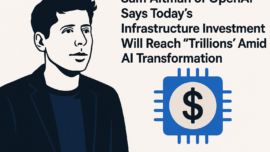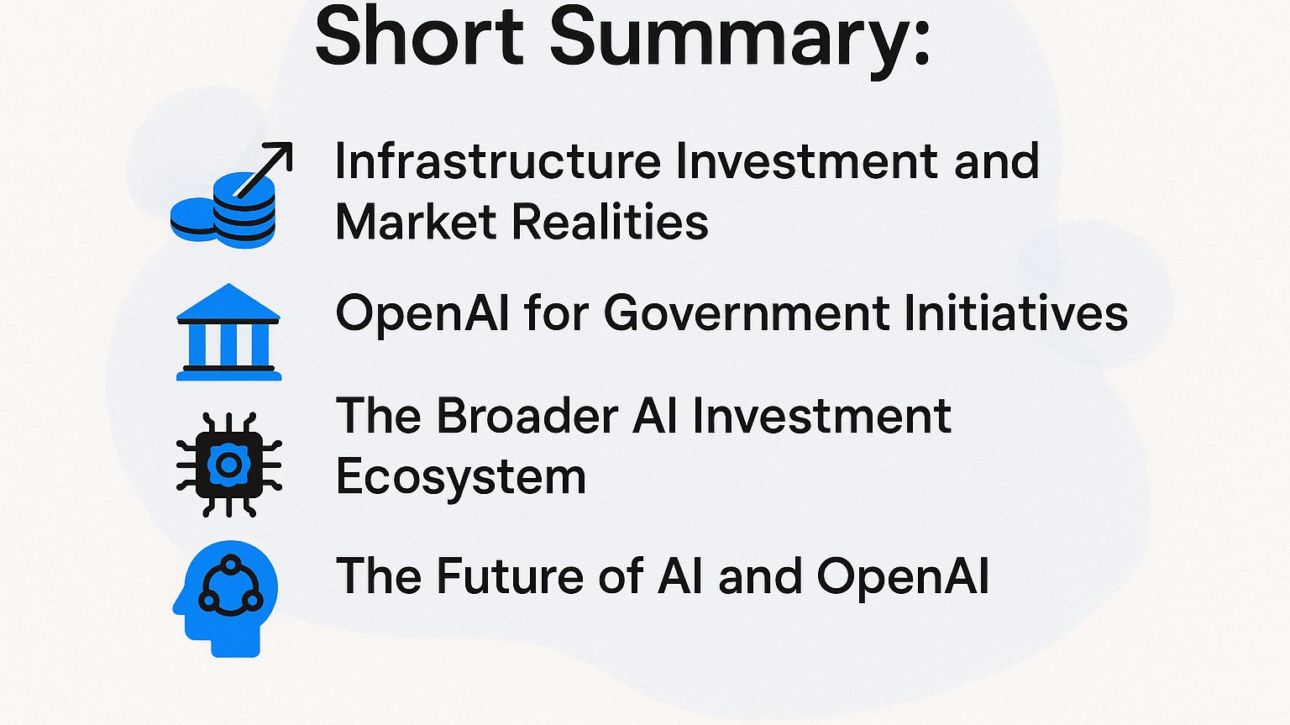In a bold declaration, Sam Altman, CEO and co-founder of OpenAI, projected that the organization will invest trillions of dollars in infrastructure to support the burgeoning field of artificial intelligence. His remarks come amidst a rapidly changing technological landscape, raising questions about funding and the future of AI development.
Contents
Short Summary:
- Sam Altman anticipates trillions in infrastructure investments for AI transformation.
- OpenAI is collaborating with major partners like SoftBank and Oracle for Project Stargate.
- Altman acknowledges potential market corrections but remains optimistic about AI’s long-term benefits.
As artificial intelligence continues to revolutionize industries and spark a surge of investment, Sam Altman has ambitious plans for OpenAI’s growth trajectory. In recent statements made during a media briefing, Altman projected that his company is poised to spend “trillions of dollars” over the coming years to enhance AI infrastructure. This monumental investment reflects OpenAI’s commitment to lead in a competitive landscape that is witnessing unprecedented amounts of capital flowing into AI startups.
According to a report by Bloomberg, Altman remarked, “You should expect a bunch of economists to say, ‘This is so crazy, it’s so reckless, and whatever.’ And we’ll just be like, ‘You know what? Let us do our thing.’” This candid admission underlines his readiness to confront skepticism as he navigates the landscape of AI development.
“I suspect we can design a very interesting new kind of financial instrument for finance and compute that the world has not yet figured it out. We’re working on it,” Altman elaborated, indicating a forward-thinking approach to financing.
One of the most telling indicators of OpenAI’s ambitious plans is its collaboration with significant corporate partners including SoftBank Group Corp. and Oracle Corp. for Project Stargate. This initiative, announced earlier this year, is set to recognize an investment of $500 billion over four years to bolster the necessary infrastructure for AI operations. Such an expansive plan indicates OpenAI’s strategy of integrating formidable financial resources to navigate its future growth.
Altman’s remarks also draw parallels to the notorious dot-com bubble, suggesting that while current valuations in AI may appear inflated, the underlying technology has real substance and potential for long-term impact on society. He stated confidently that, “Even though some AI startup valuations are insane, society as a whole is unlikely to regret the investments in AI.” This reflects a nuanced understanding that the ramifications of today’s investments may stretch far beyond immediate financial returns.
Infrastructure Investment and Market Realities
Altman’s projections present a fascinating juxtaposition to existing market forecasts. The global AI market is projected to be valued at approximately $826.7 billion by 2030, with the generative AI segment alone predicted to reach about $150 billion by 2032. However, Altman’s vision for a trillion-dollar investment significantly eclipses these forecasts, highlighting his belief that the technological evolution of AI necessitates an entirely different scale of infrastructure.
“When bubbles happen, smart people get overexcited about a kernel of truth,” Altman commented, indicating an awareness of the speculative nature of current investment trends.
Furthermore, the acceleration of AI technology has resulted in a pronounced pattern of capital accumulation in leading players, placing immense pressure on emerging companies seeking to carve out niches in an already competitive marketplace. According to reports, U.S. private AI investment totaled approximately $109.1 billion in just 2024 alone, showcasing a vast disparity between traditional financing channels and the current demands of companies at the AI frontier.
In particular, the overwhelming concentration of capital among a select few firms raises questions about sustainable growth. As revealed in a Latest AI News report, OpenAI has already secured around $58 billion while generating $13 billion in annual recurring revenue. This scenario underscores the challenges that frontier AI companies face as they navigate massive capital requirements which necessitate innovative financial instruments, a point Altman emphasized in his discussions.
OpenAI for Government Initiatives
An intriguing aspect of OpenAI’s trajectory involves its recent partnership with the U.S. General Services Administration (GSA). This collaboration aims to provide federal agencies with access to the company’s advanced AI models, specifically through ChatGPT Enterprise, at a modest rate of $1 per agency for the upcoming year. This agreement is the first initiative under the OpenAI for Government program and serves as a critical component of President Donald Trump’s AI Action Plan.
“The program is designed to help government workers allocate more time to public service priorities and less time to administrative tasks,” OpenAI articulated.
Aligned with security measures, the deployment of ChatGPT Enterprise represents an evolution in how federal agencies can leverage AI without compromising sensitive data. OpenAI assures that customer data will not be used to train its models, reinforcing safeguards during this significant rollout phase. Furthermore, this partnership highlights OpenAI’s ongoing commitment to not only advance AI technology but also ensure its responsible implementation.
The Broader AI Investment Ecosystem
Despite the enthusiastic outlook surrounding AI, Altman is not oblivious to the presence of bubbles within the market—a statement he has echoed repeatedly in interviews. During a thoughtful discussion in San Francisco, he candidly admitted that the current climate mirrors the tech bubble of the late 1990s, where remarkable advancements sparked a frenzy of investment driven more by emotion than accurate valuations. “Are we in a phase where investors as a whole are overexcited about AI? My opinion is yes,” he stated directly.
His observations come as several high-profile funding rounds in AI companies continue to attract attention, distorting traditional market behaviors. Startups attributed with lofty valuations have emerged, many without established operational frameworks or proven business models—an indication of the frenetic energy driving investment in this space. Altman himself pointed out that irrational funding practices might eventually lead some to lose significant sums in this rush to champion AI.
“That’s not rational behavior. Someone’s gonna get burned there,” Altman warned, presaging potential downturns as a result of excessive speculation.
The Future of AI and OpenAI
Altman remains optimistic, however, asserting that regardless of individual incidents of loss, the collective impact of AI on the economy is likely to be positive—similar to the internet’s transformative influence post-dot-com crash. His unwavering belief in AI’s capacity to spur economic growth reflects an enduring optimism that encourages public and private investment in the sector.
With the possibilities expanding rapidly, Altman hinted at the prospect of OpenAI eventually going public, though he refrained from detailing a set timeline. As regulatory discussions continue, particularly around AI applications, the organization may find itself at an essential crossroads that could redefine its operational priorities and funding strategies.
In this context, the ambitious infrastructure investments Altman envisions underscore a broader objective: to lay the groundwork for sustainable and groundbreaking technological advancements that could shape not only businesses but society as a whole. “You should expect OpenAI to spend trillions of dollars on data center construction in the not very distant future,” he stated emphatically, a vision that reiterates OpenAI’s commitment to being at the forefront of AI evolution.
The reality that lies ahead for OpenAI and the stakeholders involved will be determined by how well the organization navigates the turbulent waters of investor speculation, market corrections, and the overarching demand for innovation. As Altman prepares to forge ahead, maintaining a balance between ambition and pragmatism will be key to achieving the high aspirations that have been set forth.
Ultimately, the trajectory of AI investment reshapes the landscape; with tools such as Autoblogging.ai evolving to meet the needs of content creators seeking to harness these emergent technologies. As the AI narrative unfolds, Bob’s ambitions highlight the ascendance of data-driven decisions and innovative financial instruments that could redefine how the world shapes and interacts with intelligent systems.
For those seeking to leverage advancements in AI for personal or business growth, staying informed through platforms like Autoblogging’s Knowledge Base is essential. With the AI ecosystem in constant flux, being equipped with the right tools and insights ensures you’re not left behind as the next chapter of this technological revolution unfolds.
Do you need SEO Optimized AI Articles?
Autoblogging.ai is built by SEOs, for SEOs!
Get 30 article credits!



